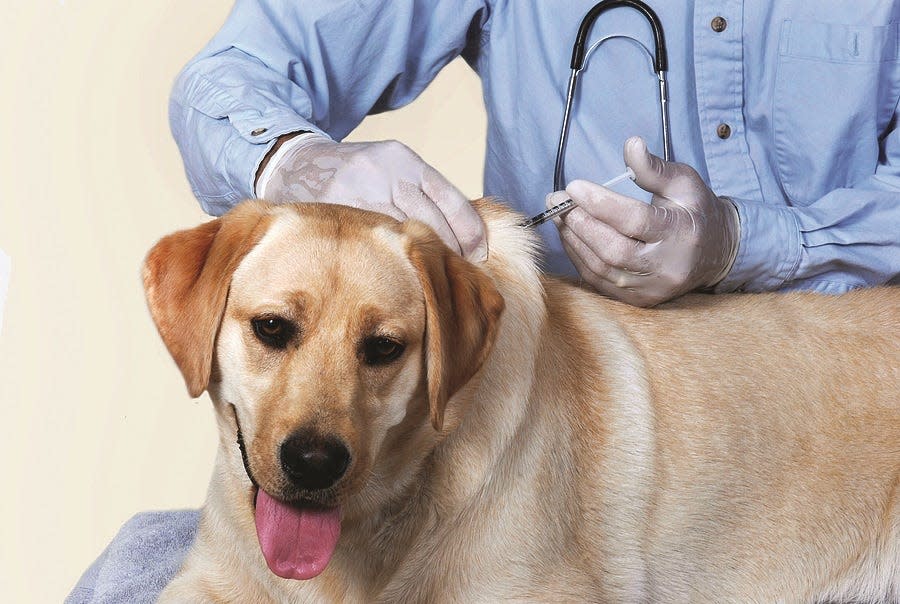SHOT IN THE DARK: 9 facts about rabies vaccinations for pets

The earliest rabies vaccine was given to dogs in 1885, and by the 1940s, routine rabies vaccination of owned dogs against the fatal virus gradually led to elimination of the canine rabies strain in the United States and Canada by 2008.
Today, rabies in humans is rarely seen in the U.S. and Canada and is primarily transmitted by wild animals. Elsewhere in the world, some 59,000 people die annually from rabies, most frequently transmitted by dog bites.
Getting pets vaccinated for rabies (and other deadly diseases) might seem like a no-brainer, but a study published last month in the journal Vaccine found that of 2,200 people who participated in an online survey, a large minority of dog owners consider vaccines administered to dogs to be unsafe (37%), ineffective (22%) or unnecessary (30%). A slight majority (53%) of dog owners agree with at least one of these positions. Their beliefs have a name: canine vaccine hesitancy, or CVH.
Vaccine hesitancy risks pet lives, especially when it comes to deadly diseases such as rabies, distemper and parvovirus. No vaccine — human or animal — offers 100% protection against disease, but vaccinations greatly reduce the risk of disease and improve the chances of survival. With World Rabies Day coming up on Sept. 28, we thought we’d explore the must-know issues related to rabies vaccination.
Rabies vaccination law varies from state to state. Most states mandate rabies vaccinations for dogs, cats and ferrets. In New Jersey, only dogs are required to be vaccinated for rabies, but vaccinations are strongly recommended for cats and ferrets. Kansas, Minnesota and Ohio are the only states that leave rabies law to the discretion of cities and counties.
Not all states mandate rabies vaccination for cats, but all cats, including indoor-only pets, benefit from rabies vaccination. Cats can slip out open doors, and it’s not unusual for bats to fly in through open windows (ask me how I know this).
Hybrid animals, such as dog-wolf crosses or domestic cat-serval crosses, can be vaccinated, but most states don’t recognize them as such. If they’re exposed to a rabid animal or they bite a person, they can be subject to euthanasia rather than home quarantine, which can be 10 days or longer.
Whether for a domestic or hybrid animal, the definition of “exposure” is determined by each state’s public health authority.
Unvaccinated domestic animals exposed to rabies typically must undergo a strict four- to six-month quarantine and vaccination within 96 hours of exposure. The cost of that long quarantine period can be several thousand dollars.
In most cases, euthanasia and testing are not required if an unvaccinated pet bites a person. Typically, exposed animals are subject to home quarantine for a specific period with revaccination on release. However, a person who is bitten by an unvaccinated pet can demand that the animal be euthanized and the brain tested immediately. No blood test or other diagnostic can determine if an animal has rabies.
No states recognize age or health conditions as reasons to discontinue rabies vaccinations. Nor do they recognize rabies titers as proof of vaccination. The only time a rabies titer is required is when a pet will be traveling overseas.
Rabies vaccines can be given annually or triennially (every three years). Generally, the only difference between the one-year and three-year rabies vaccines is how they are labeled. But if a pet is given a rabies vaccine labeled for one year, you can’t argue that you should be allowed to wait three years to revaccinate.
Animals are not considered vaccinated until 28 days after the initial inoculation, but once they receive rabies booster shots, they are considered immunized immediately.
Find more information on your state’s rabies laws at rabiesaware.org.
— Kim Campbell Thornton
Do you have a pet question? Send it to askpetconnection@gmail.com or visit Facebook.com/DrMartyBecker. Pet Connection is produced by veterinarian Dr. Marty Becker, journalist Kim Campbell Thornton, and dog trainer/behavior consultant Mikkel Becker. ©2023 Andrews McMeel Syndication
This article originally appeared on South Bend Tribune: Pet Connection: 9 Facts about rabies vaccinations for pets

